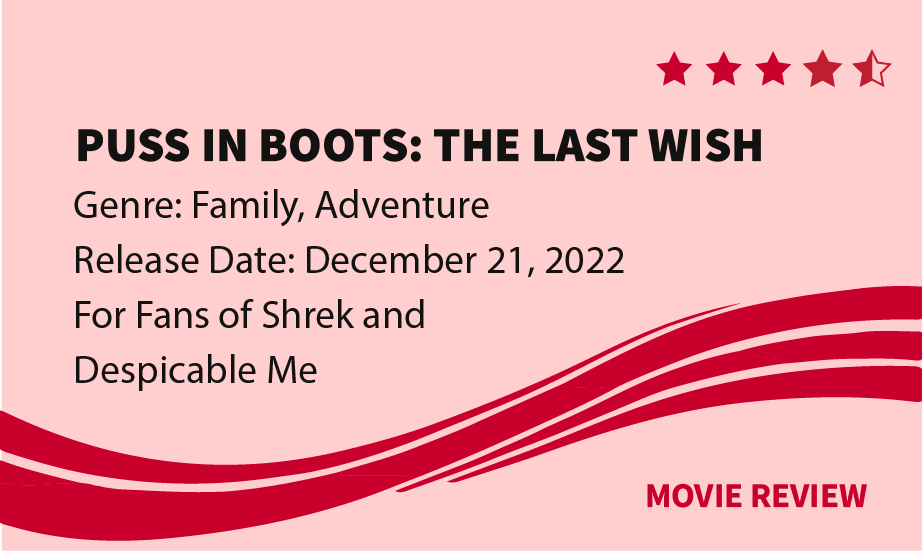Puss in Boots is a hero for the people

I didn’t particularly want to watch “Puss in Boots: The Last Wish” when my friends texted me about our Sunday night plans on the eve of my final semester at USC. I don’t know if it was because I thought I was above the “Shrek” franchise, considering the 21-and-a-half years of wisdom and maturity I have accrued while attending this university, but I would have rather watched “Sunday Night Football” or gone to Dave and Buster’s (or watched “Sunday Night Football” at Dave and Buster’s) instead of viewing the second installment in the “Puss in Boots” saga.
Consider my mind changed. More than anything, I laughed — particularly at whatever “Big” Jack Horner, voiced by comedian John Mulaney, had to say. The movie also, perhaps unsurprisingly, provided opportunities to reflect on the overwhelmingly broad concept of life and its limitations.
But first, the jokes. Horner, one of the villains in the flick, was a man-child in every sense. Without getting too political, his appearance and characteristics scream Washington and the antagonist might as well be gracing the White House or Senate floor. He looks ridiculous and is unabashedly evil but, because of his inherited wealth and arsenal of magic toys — ranging from the magic carpet from “Aladdin” (1992) to King Arthur’s Excalibur — Horner poses a major threat to a dejected Puss, who competes with a host of fairy tale favorites to find the Wishing Star.
The Wishing Star is what it sounds like: a hidden star that grants one wish to whoever runs through the gauntlet of traps and tricks that precede its discovery.
For Puss, finding the Wishing Star is a matter of life and death. After running out of his first eight lives, Puss becomes entranced with the idea of using the Wishing Star to wish for a fresh set of nine (which begs the question, “Why stop at nine, Puss?”). The celebrated outlaw no longer has the freedom to risk death at every turn, made evident by his chilling encounter with a ferocious bounty hunter who intimidates Puss so much that he does something he had never done before: run away from a fight.
On the quest for a life-refill, Puss encounters new friends and familiar faces. One, a nameless dog who immediately clings to Puss, pulls out a softer side of the habitually tough tomcat. The other, a former fiancée of Puss’ named Kitty Softpaws, serves as a powerful reminder of the past and everything that makes life worth living.
No matter what good befalls Puss and his friends, though, the cat is constantly in terror that the bounty hunter, a large hooded wolf with red eyes and unknown magical powers, will catch up to him. Death, as we know, comes for us all in the end.
I won’t necessarily equate dying with graduating from this university … but I will try. Having started my last semester at USC, I could relate to Puss’ anxiety as he faced his ninth and final life. I would probably use the Wishing Star to find a job (or wish for more wishes) instead of extending my lifespan ninefold, but the ability to wish for anything I want would be tempting enough to launch me on a dangerous quest full of unknowns as well. Which I suppose is what life is, anyway. There, I tried.
A welcome addition to the cast and a comforting presence to those experiencing quarter-life crises is the beloved Jiminy Cricket of “Pinocchio” (1940) fame, serving as Horner’s conscience (or, at least, trying to). Throughout the film, Horner’s savagery and dismissal of human life is present and horrifies the poor cricket.
Horner’s crew of pie-makers (dubbed the “Baker’s Dozen”) disappears faster than cornbread at the Warren family dinner table, but Horner pays their sacrifice no mind. At one point, Jiminy tells the abnormally large, but small-headed Horner that he is an “irredeemable monster,” before giving up on guiding the tyrannical pie CEO. Which is an important lesson in itself: Not everyone deserves second or third or fourth chances.
Puss, on the other hand, ends up reversing some of his actions that hurt those he cared about. While he’s focused on his own life for the majority of the movie, he realizes some of his past misfires and shows some accountability and remorse for hurting his loved ones — a trait that seems to escape many these days.
“Puss in Boots: The Last Wish” is fun for kids (I would imagine; I am not one anymore) as well as super mature and sophisticated 21-year-olds. It will make you ponder over what you want to do with your only remaining life just as much as it’ll make you laugh obnoxiously loud — although that might have just been the weed.

